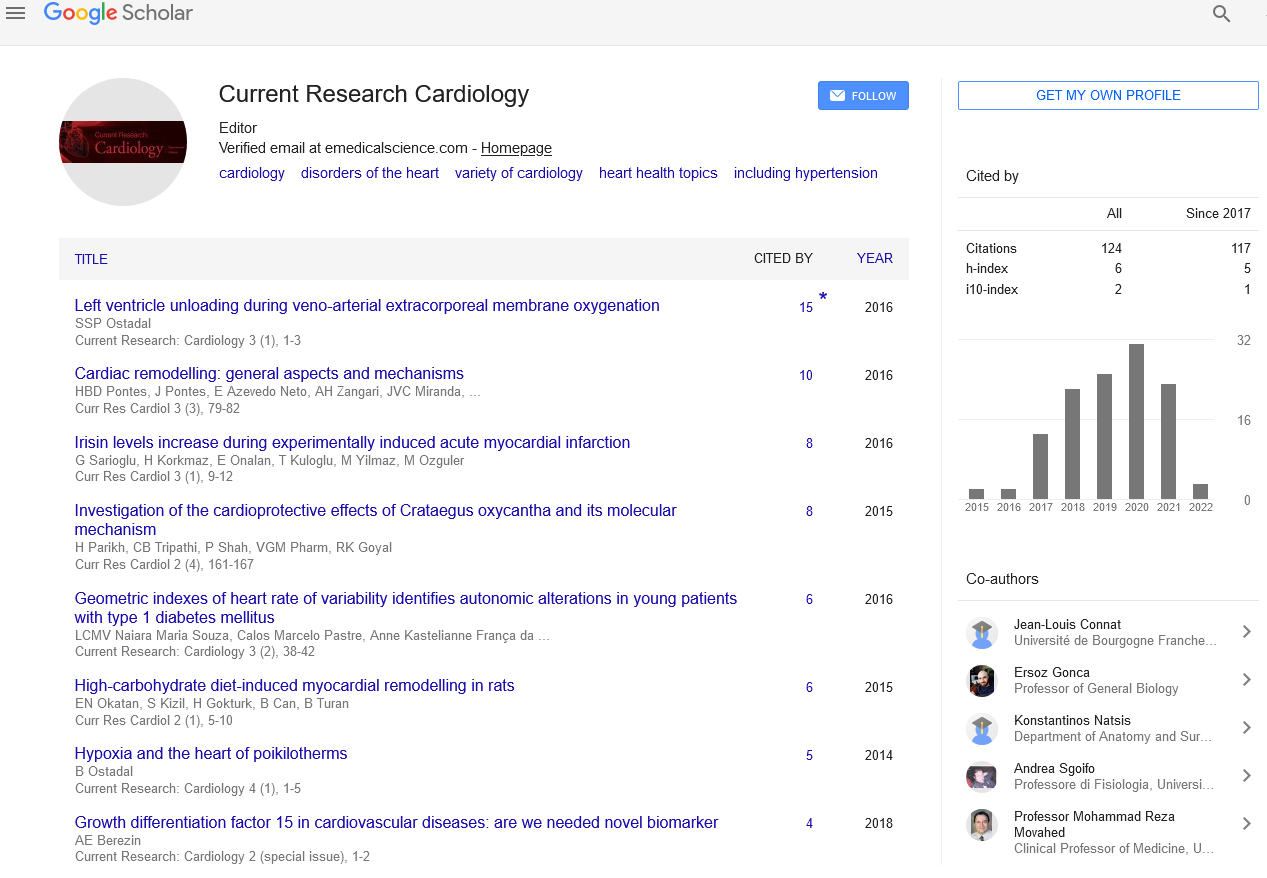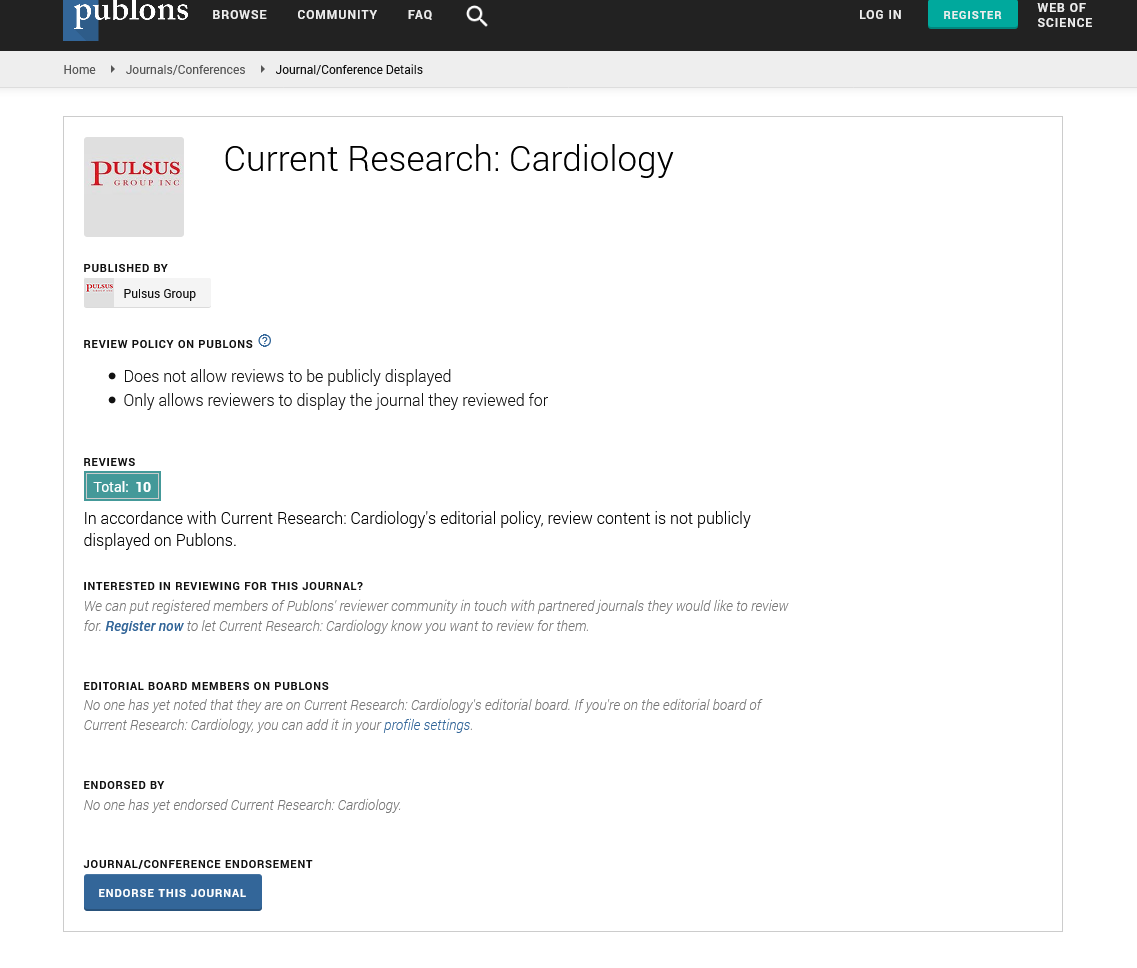Risk factors involved in cardiovascular diseases
Received: 01-Nov-2021 Accepted Date: Nov 15, 2021; Published: 22-Nov-2021
Citation: Li D. Risk factors involved in cardiovascular diseases. Curr Res Cardiol 2021;8(4):4.
This open-access article is distributed under the terms of the Creative Commons Attribution Non-Commercial License (CC BY-NC) (http://creativecommons.org/licenses/by-nc/4.0/), which permits reuse, distribution and reproduction of the article, provided that the original work is properly cited and the reuse is restricted to noncommercial purposes. For commercial reuse, contact reprints@pulsus.com
Description
The term "Cardiovascular Disease (CVD)" refers to any ailment that affects the heart or blood vessels. It's usually linked to fatty deposits in the arteries (atherosclerosis) and an elevated risk of blood clots. It has also been related to artery damage in organs like the brain, heart, kidneys, and eyes. CVD is one of the primary causes of death and disability in the United Kingdom, yet it may often be avoided by maintaining a healthy lifestyle. Unhealthy diet, physical inactivity, cigarette use, and excessive alcohol consumption are the most major behavioral risk factors for heart disease and stroke. Individuals may experience symptoms such as high blood pressure, high blood glucose, high blood lipids, and overweight or obesity as a result of behavioral risk factors. Tobacco cessation, salt reduction in the diet, higher fruit and vegetable consumption, regular physical activity, and avoidance of chronic alcohol use have all been demonstrated to lessen the risk of cardiovascular disease. Globalization, urbanization, and population ageing are three primary drivers pushing social, economic, and cultural change and poverty, stress, and inherited factors are other determinants of CVDs. Furthermore, pharmacological treatment for hypertension, diabetes, and high blood lipids is required to lower cardiovascular risk and prevent heart attacks and strokes in persons with these diseases.
What health conditions increase the risk of heart disease?
High blood pressure:Heart disease is caused by high blood pressure, which is a key risk factor. It is a medical disorder in which the blood pressure in your arteries and other blood vessels becomes excessively high. If a person’s blood pressure isn't under control, it can harm your heart and other vital organs in body, such as kidneys and brain. Because it frequently has no symptoms, high blood pressure is referred to as a "silent killer." Measuring of blood pressure is the only way to find out if a person is having high blood pressure. Risk of heart disease and heart attack can be reducing by lowering of blood pressure by lifestyle modifications or medication.
Unhealthy blood cholesterol levels: Cholesterol is a waxy, fatlike substance produced by the liver and present in a number of foods. Liver produces enough cholesterol to meet body's requirements, but it often consumes too much cholesterol from the foods a person eats. Extra cholesterol can build up in the walls of arteries, especially those of the heart, if a person consumes more cholesterol than the body can use. The arteries narrow as a result, reducing blood flow to the heart, brain, kidneys, and other organs of the body. LDL (low-density lipoprotein) cholesterol is regarded "bad" cholesterol because it can induce plaque buildup in your arteries, while HDL (high-density lipoprotein) cholesterol is considered "good" cholesterol because greater levels provide some protection against heart disease. There are frequently no signs or symptoms of high blood cholesterol. A simple blood test called a "lipid profile" can be used by health care team to determine the cholesterol levels.
Diabetes: It causes sugar levels to get build up in the blood. Mostly diabetic people are in greater risk of death from heart disease than non-diabetic people. Managing of elevated blood glucose level will reduce the chance of getting risk of cardiovascular related diseases.
Obesity: Excess of body fat is called to be as obesity, which is linked to higher “bad” cholesterol and triglyceride levels and to lower “good” cholesterol levels. Obese patients are having greater risk to develop cardiovascular related disorders and diabetes. Reducing of weight can be the main preventable way for obese patients.






